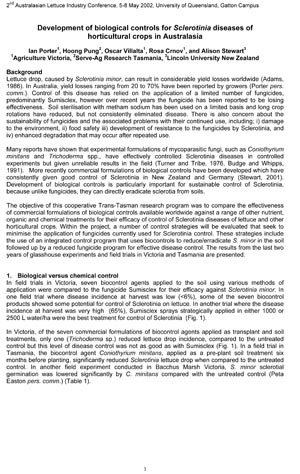|
|
Lettuce drop, caused by Sclerotinia minor, can result in considerable yield losses worldwide. In Australia, yield losses ranging from 20 to 70% have been reported by growers. Control of this disease has relied on the application of a limited number of fungicides, predominantly Sumisclex, however over recent years the fungicide has been reported to be losing effectiveness. Soil sterilisation with metham sodium has been used on a limited basis and long crop rotations have reduced, but not consistently eliminated disease.
Field trials in Victoria have shown that disease control levels obtained with the biological control agents Trichoderma and Coniothyrium minitans were not as good as those obtained in New Zealand. This could be due to either poor survival of the biocontrol agents in the new commercial formulations being developed, or lack of survival of the biocontrols in the warmer soil conditions experienced at the time of application in Australian soils. The lack of survival could also be due to the lower level of organic matter found in Victorian soils where disease occurs. |
||||||||
|

